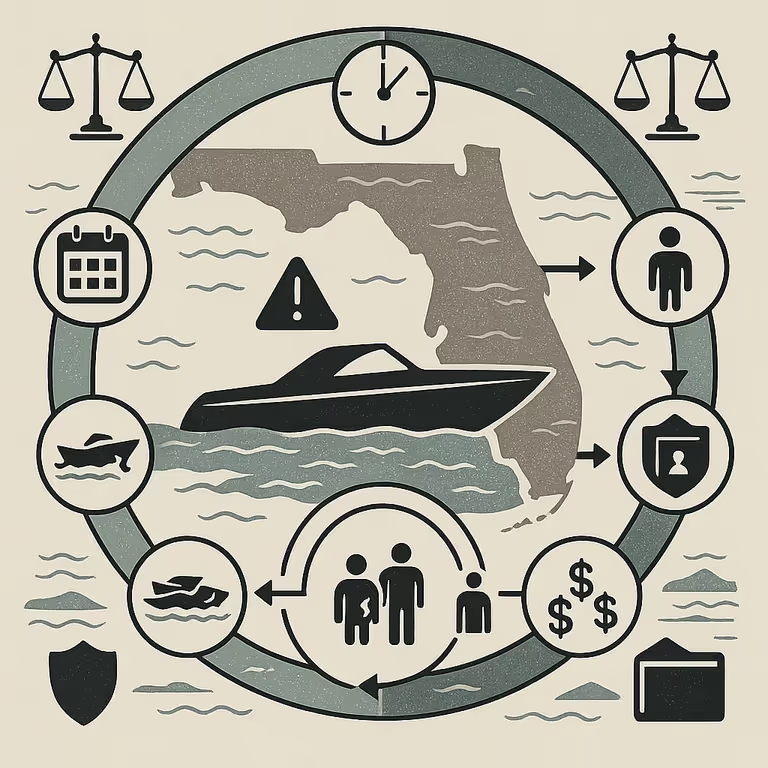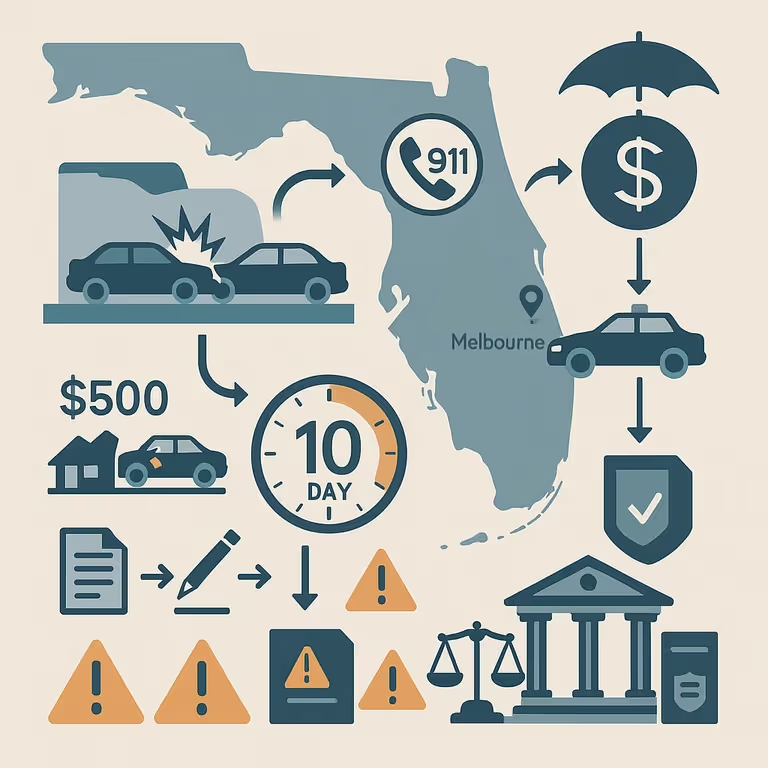2025 Guide to Florida Child Car Seat Laws: Ages, Requirements, and Penalties
Complete guide to Florida child car seat laws by age group. Learn requirements for infants, toddlers, and children plus penalties for violations.
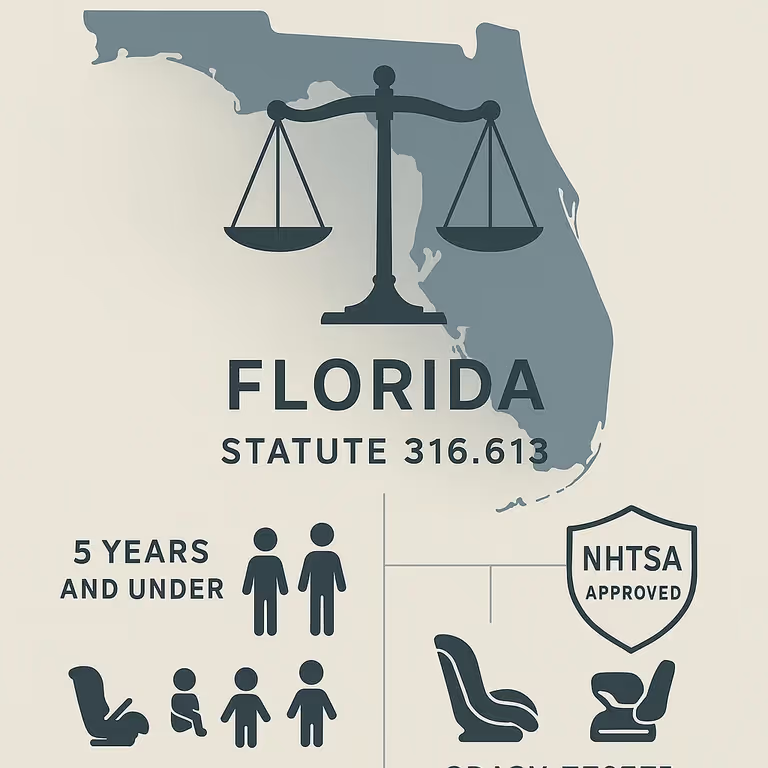
- Florida law requires children 0-3 in separate carriers or integrated seats, ages 4-5 can use boosters, and 6+ need proper seatbelts.
- Violations result in $60 fines and 3 license points, but proper compliance protects children and provides legal protection.
- All child restraints must be crash-tested and federally approved regardless of age group or device type selected.
Worried About Your Injury Case? We'll Review It - Free!
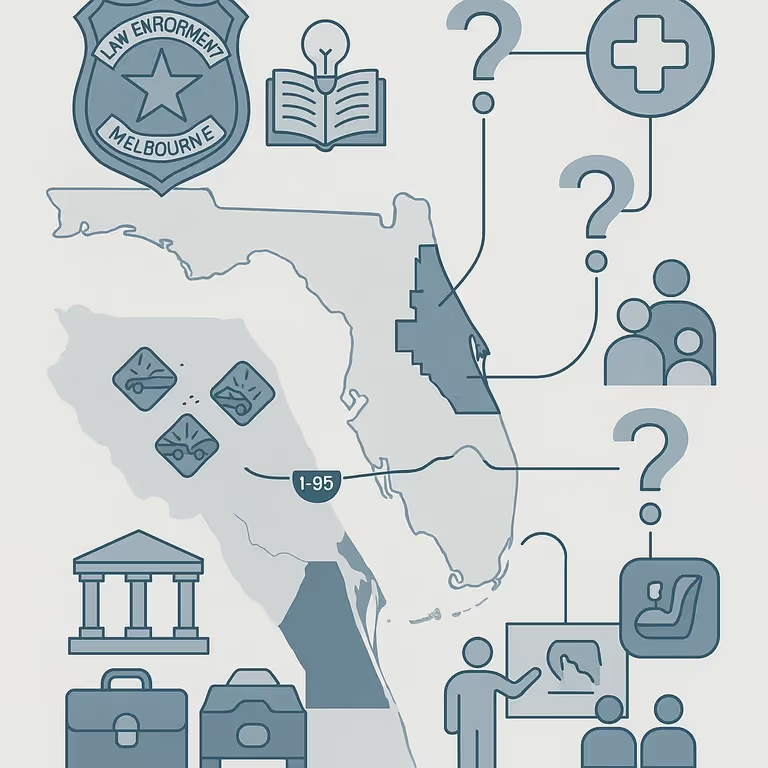

As a parent in Florida, ensuring your child's safety while traveling is both a legal requirement and a moral responsibility. Every year, thousands of children are injured in vehicle accidents across the state, making proper child restraint compliance one of the most critical safety decisions you'll make as a family.
Understanding Florida's Child Car Seat Law: What Every Parent Must Know
Florida Statute 316.613 establishes clear legal requirements that every parent and caregiver must follow when transporting children in motor vehicles. This law requires all children 5 years of age or younger to be properly secured in crash-tested, federally approved child restraint devices while traveling on any Florida roadway, street, or highway.
The statute states explicitly: "Every operator of a motor vehicle as defined in this section, while transporting a child in a motor vehicle operated on the roadways, streets, or highways of this state, shall, if the child is 5 years of age or younger, provide for protection of the child by properly using a crash-tested, federally approved child restraint device."
This requirement applies uniformly across all of Florida, including Melbourne, Brevard County, and every other jurisdiction in the state. There are no local exemptions or variations - the law is consistent whether you're driving through downtown Melbourne or traveling on I-95 through Central Florida.
The key phrase "crash-tested, federally approved" means that any child restraint device you use must meet federal safety standards established by the National Highway Traffic Safety Administration (NHTSA). This ensures that the equipment has undergone rigorous testing to protect children in the event of a collision.
For families in our area, understanding these requirements isn't just about avoiding legal penalties - it's about protecting your most precious cargo. Melbourne families need to understand how proper child restraints can significantly affect injury outcomes when accidents occur, making compliance both a legal necessity and a safety imperative.
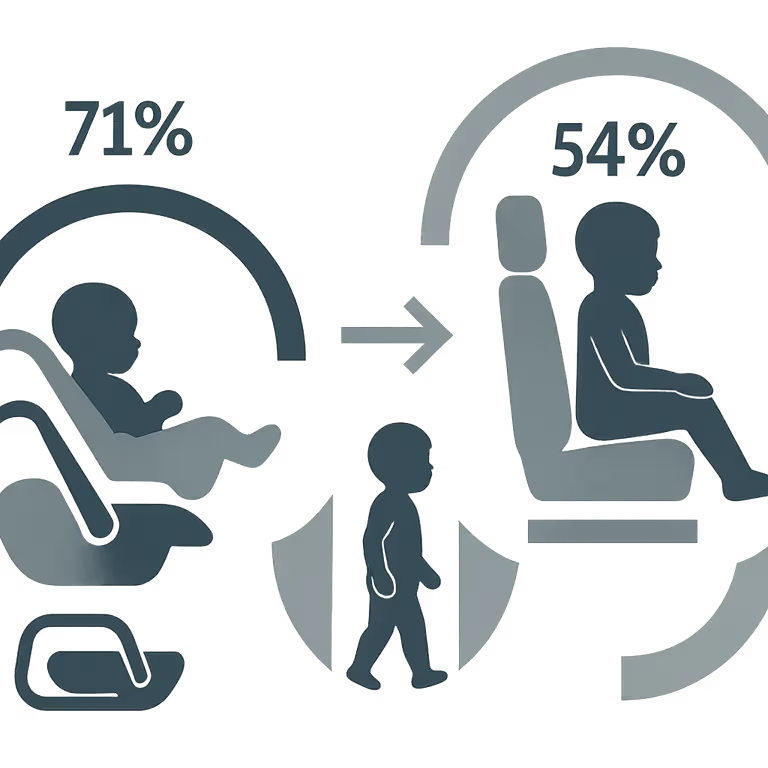
Requirements for Infants and Toddlers (Ages 0-3): Critical Safety Rules
Children from birth through 3 years of age represent the most vulnerable passengers in any vehicle, making proper restraint absolutely critical for their safety and required under Florida law. For this age group, the legal requirements are specific and non-negotiable.
Under Florida Statute 316.613, children aged 0-3 years must be secured using either a separate carrier or the vehicle manufacturer's integrated child seat. These are the only two legally acceptable options for this age group, and there are no exceptions for short trips or family vehicles.
A "separate carrier" refers to the portable infant car seats that most parents are familiar with - these are the seats that can be removed from the vehicle and often click into a base that remains installed in your car. These carriers are designed specifically for the smallest passengers and provide the highest level of protection for infants and toddlers.
An "integrated child seat" refers to child restraint systems that are built directly into the vehicle by the manufacturer. These are less common in modern vehicles but may be found in some SUVs, minivans, and luxury vehicles. When present, they meet the same safety standards as separate carriers.
The importance of proper restraint for this age group cannot be overstated. According to safety data referenced by Melbourne Beach authorities, proper car seat installation reduces the risk of death by 71% for infants and 54% for toddlers - statistics that underscore why Florida takes these requirements so seriously.
While safety experts typically recommend keeping children rear-facing until at least age 2, Florida's law focuses on ensuring that crash-tested, federally approved devices are used rather than mandating specific positioning requirements. This approach provides parents with flexibility while maintaining the core safety protections that are legally required.
From our experience representing families in Brevard County over nearly four decades, we've seen firsthand how proper child restraint compliance can make the difference between minor injuries and tragic outcomes when accidents occur. The legal requirement exists because it works - when followed correctly, it saves lives.
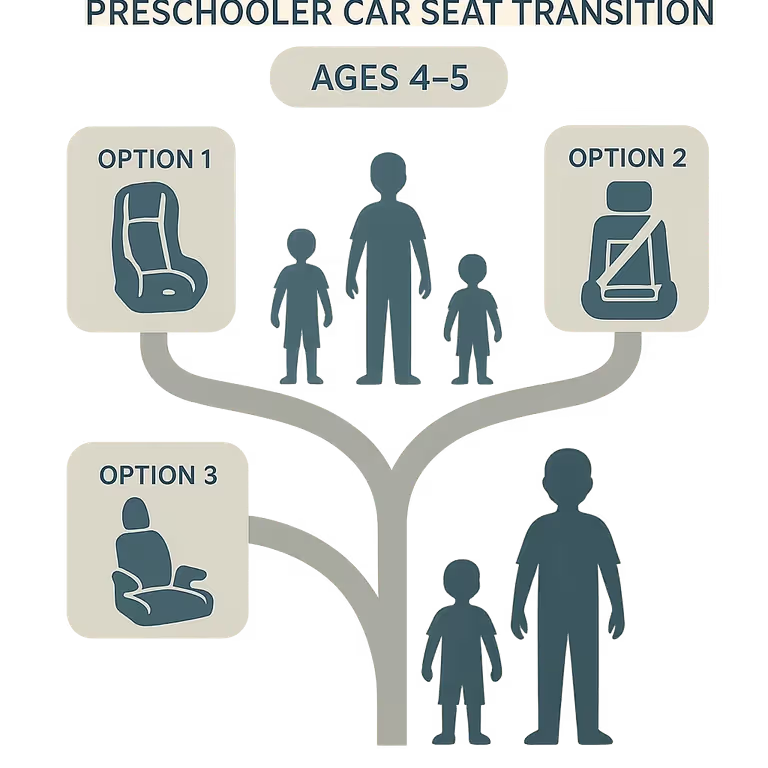
Requirements for Preschoolers (Ages 4-5): Transition Options and Key Rules
Children aged 4 and 5 years old occupy a unique position under Florida's child restraint law, as this age group has expanded options while still requiring mandatory safety protection. Understanding these options helps parents make informed decisions about their child's safety while remaining in full compliance with state law.
For preschoolers ages 4-5, Florida Statute 316.613 permits three different restraint options: a separate carrier, an integrated child seat, or a booster seat. This expansion of choices reflects the transitional nature of this age group, as children begin outgrowing infant carriers but may not yet be ready for adult seatbelts alone.
The addition of "booster seat" as a legal option beginning at age 4 represents a significant milestone for many families. Booster seats work by properly positioning the vehicle's existing seatbelt system to fit a child's smaller frame, ensuring that the lap and shoulder belts cross the child's body at appropriate points for maximum protection.
Regardless of which option parents choose for their 4-5 year old, the fundamental requirement remains unchanged: any restraint device must be crash-tested and federally approved. This means that whether you select a traditional car seat, a high-back booster, or a backless booster seat, it must display the appropriate NHTSA approval labels and meet current safety standards.
The flexibility built into Florida law for this age group recognizes that children develop at different rates. A smaller 4-year-old might still be most safely secured in a traditional car seat that accommodates their size and weight, while a larger 5-year-old might be ready to transition to a booster seat that works with the vehicle's seatbelt system.
This transitional period is when many parents have questions about timing and appropriateness of different restraint options. The key is to remember that Florida law provides the legal framework, but manufacturer guidelines for weight and height limits still apply to any specific device you choose. Staying compliant with both legal requirements and manufacturer specifications ensures optimal safety and legal protection.
For Central Florida families navigating this transition, the flexibility of having multiple options means you can choose the restraint method that works best for your child's individual needs while meeting your legal obligations under Florida law.
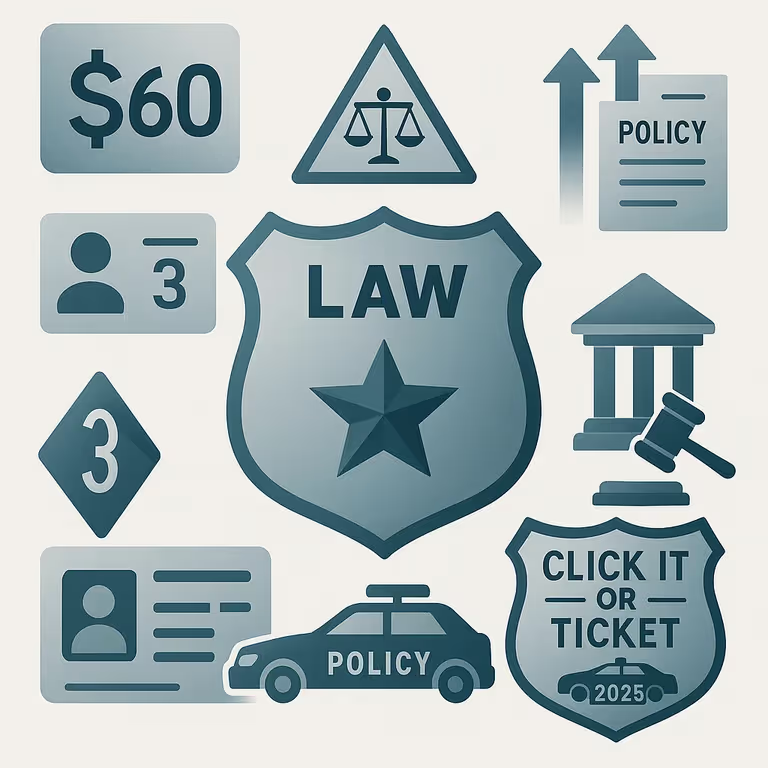
Penalties, Enforcement, and Legal Consequences: What You Need to Know
Understanding the consequences of failing to comply with Florida's child restraint requirements is essential for every parent and caregiver. The state takes these violations seriously, with meaningful penalties designed to encourage compliance and protect child safety.
A violation of Florida's child car seat law results in a $60 fine and 3 points assessed against the driver's license. This penalty structure classifies child restraint violations as moving violations under Chapter 318 of Florida Statutes, making them more serious than simple parking tickets or minor infractions.
The 3-point penalty can have lasting consequences beyond the immediate fine. Insurance companies typically review driving records and may increase premiums based on accumulated points. Additionally, Florida's point system can lead to license suspension if a driver accumulates too many points within a specific timeframe, making child restraint compliance important for maintaining your driving privileges.
However, Florida law does provide some relief for drivers who demonstrate a commitment to child safety education. Courts have discretion to waive the 3 license points if the driver completes a child safety program approved by the Department of Highway Safety and Motor Vehicles. This option recognizes that education and awareness can be more effective than punishment alone in promoting long-term compliance.
In 2025, Florida law enforcement has increased focus on child restraint compliance as part of the expanded "Click It or Ticket" campaign. This heightened enforcement means that officers are more actively monitoring proper child restraint usage during routine traffic stops and safety checkpoints throughout Central Florida and beyond.
Beyond the immediate legal penalties, improper child restraint can have far more serious consequences if an accident occurs. Central Florida parents should understand how child restraint compliance can significantly affect both legal liability and injury outcomes in accident cases.
In our experience representing Brevard County families since 1988, we've observed how child restraint violations can complicate personal injury claims and affect case outcomes. Proper compliance not only protects your child physically but also provides legal protection if the unthinkable happens. Insurance companies and opposing parties may scrutinize child restraint compliance when determining fault and calculating compensation in accident cases.
The financial cost of a $60 fine pales in comparison to the potential consequences of an improperly restrained child in an accident. From both a safety and legal standpoint, ensuring proper child restraint compliance is one of the most important responsibilities of vehicle operation in Florida.

What About Children 6 and Older? Understanding the Transition to Seatbelts
Once children reach age 6, they are no longer covered by Florida's specific child restraint law (Statute 316.613), but this doesn't mean safety requirements disappear entirely. Instead, these children fall under Florida's general seatbelt requirements outlined in Statute 316.614, which governs seatbelt usage for all passengers over 5 years old.
This transition often creates confusion for parents who may have heard conflicting information about age requirements for front seat riding or specific height and weight thresholds. It's important to distinguish between legal requirements and safety recommendations when making decisions about your school-age children.
Florida law does not establish a specific age requirement for children to ride in the front seat of a vehicle. The commonly cited guidelines of "age 13" or "4 feet 9 inches tall" are safety recommendations from organizations like the American Academy of Pediatrics and NHTSA, not legal mandates under Florida statute. While these recommendations are based on extensive safety research and should be carefully considered, they are not legally enforceable requirements in our state.
What Florida law does require is that all passengers 6 years and older must wear properly fitted seatbelts when the vehicle is in motion. This means that whether your child sits in the front or back seat, they must be secured with the vehicle's seatbelt system.
Many families choose to continue using booster seats for children ages 6-8 or until they reach a height where the vehicle's seatbelt fits properly across their body. This practice, while not legally required, often provides better protection than an adult seatbelt alone for smaller children. The key is ensuring that the lap portion of the seatbelt lies across the child's hips and pelvis, not across the stomach, and the shoulder belt crosses the chest and shoulder, not the neck.
Local Considerations for Melbourne and Brevard County Families
Families living in Melbourne and throughout Brevard County benefit from local law enforcement agencies that prioritize child passenger safety education alongside enforcement. Melbourne Beach specifically emphasizes the importance of proper child restraint compliance, citing local statistics showing that correct installation reduces death risk by 71% for infants and 54% for toddlers.
Brevard County experiences thousands of traffic accidents annually, making proper child restraint compliance particularly critical for local residents. The combination of tourist traffic, I-95 corridor travel, and local residential streets creates diverse driving conditions where accidents can occur unexpectedly.
Local law enforcement agencies work actively with community organizations to provide child passenger safety education and car seat inspection events. These resources help ensure that families not only comply with legal requirements but also achieve optimal safety through proper installation and usage.
For families seeking assistance with child passenger safety questions or those who have experienced accidents involving child passengers, Brevard County families can contact our Melbourne office for guidance on both safety compliance and legal protection.
Frequently Asked Questions About Florida Child Car Seat Laws
What happens if my child is injured in an accident and wasn't properly restrained?
Improper child restraint can affect both criminal penalties and civil liability in personal injury cases. Law enforcement will examine child restraint compliance as part of their accident investigation, and this information may be used in both traffic violation proceedings and any subsequent insurance claims or legal proceedings. Proper restraint compliance provides both physical protection and legal protection for your family.
Do rental cars and rideshare vehicles need to provide car seats?
The responsibility for providing appropriate child restraints typically falls on the parent or guardian, regardless of vehicle type. Rental car companies may offer car seats for an additional fee, but most rideshare services expect passengers to provide their own child restraints. When traveling or using alternative transportation, planning for proper child restraint is essential for legal compliance and safety.
Are there medical exemptions to Florida's child car seat requirements?
Florida law provides very limited exemptions, primarily for emergency situations or specific medical conditions that prevent the use of standard restraint devices. These exemptions are rare and typically require medical documentation. Parents should not assume exemptions apply without consulting with medical professionals and legal authorities.
What constitutes "crash-tested, federally approved" child restraint devices?
Child restraint devices meeting Florida's requirements must comply with Federal Motor Vehicle Safety Standards established by NHTSA. Look for labels indicating compliance with FMVSS 213, and ensure that any device you purchase is designed for your child's current age, weight, and height. Devices should be new or have a known history, as used equipment may have been compromised in previous accidents.
Can other family members or caregivers transport my child without a car seat?
Florida's child restraint requirements apply to all drivers transporting children, regardless of their relationship to the child. Grandparents, babysitters, or other caregivers must follow the same legal requirements as parents when transporting children under 6 years of age.
Key Takeaways
Understanding Florida's child car seat laws comes down to three critical age groups: children 0-3 must use separate carriers or integrated child seats, children 4-5 have expanded options including booster seats, and children 6 and older must use properly fitted seatbelts. Compliance protects both child safety and provides legal protection for families.
The penalties for violations - $60 fines and 3 license points - underscore the state's commitment to child passenger safety. However, the real importance goes far beyond avoiding tickets. Proper restraint compliance can mean the difference between minor injuries and tragic outcomes when accidents occur.
For Melbourne and Brevard County families, staying informed about both legal requirements and evolving safety recommendations ensures that you're providing the best possible protection for your children while maintaining full compliance with Florida law.
If your family has been affected by a car accident involving a child passenger, contact Douglas R. Beam P.A. for a free consultation about your rights and options. With nearly four decades of experience representing Central Florida families and over $1 billion in verdicts and settlements, Doug Beam and Riley Beam understand how proper child restraint compliance affects both safety outcomes and legal protection. Call us at (321) 723-6591 for immediate assistance.
Sources and Further Reading
- Florida Statute 316.613 - Child Restraint Requirements – Florida Legislature
- Florida Child Restraint Law FAQ – University of Florida Public Health
- Florida's Car Seat Laws for 2025 – Pendas Law
- Florida Child Restraint Laws Penalties 2025 Update – The Ticket Clinic
- Child Restraints & Seat Belts Safety Information – Melbourne Beach Police Department
- Brevard County Traffic Accident Data – Accident Data Center
This article provides general information and is not a substitute for legal advice. Laws can change, and the details of your situation matter. For personalized guidance, please contact a qualified Florida personal injury attorney.
Not Sure What To Do Next? We Can Help – Fast & Free.
Worried About Your Injury Case?
We'll Review It - Free
Don’t miss an article
Florida law, local insights, and the occasional dog pic.
Delivered straight to your inbox.
More articles
Browse all articlesFree Case Review
Get a complimentary review of your case

.webp)
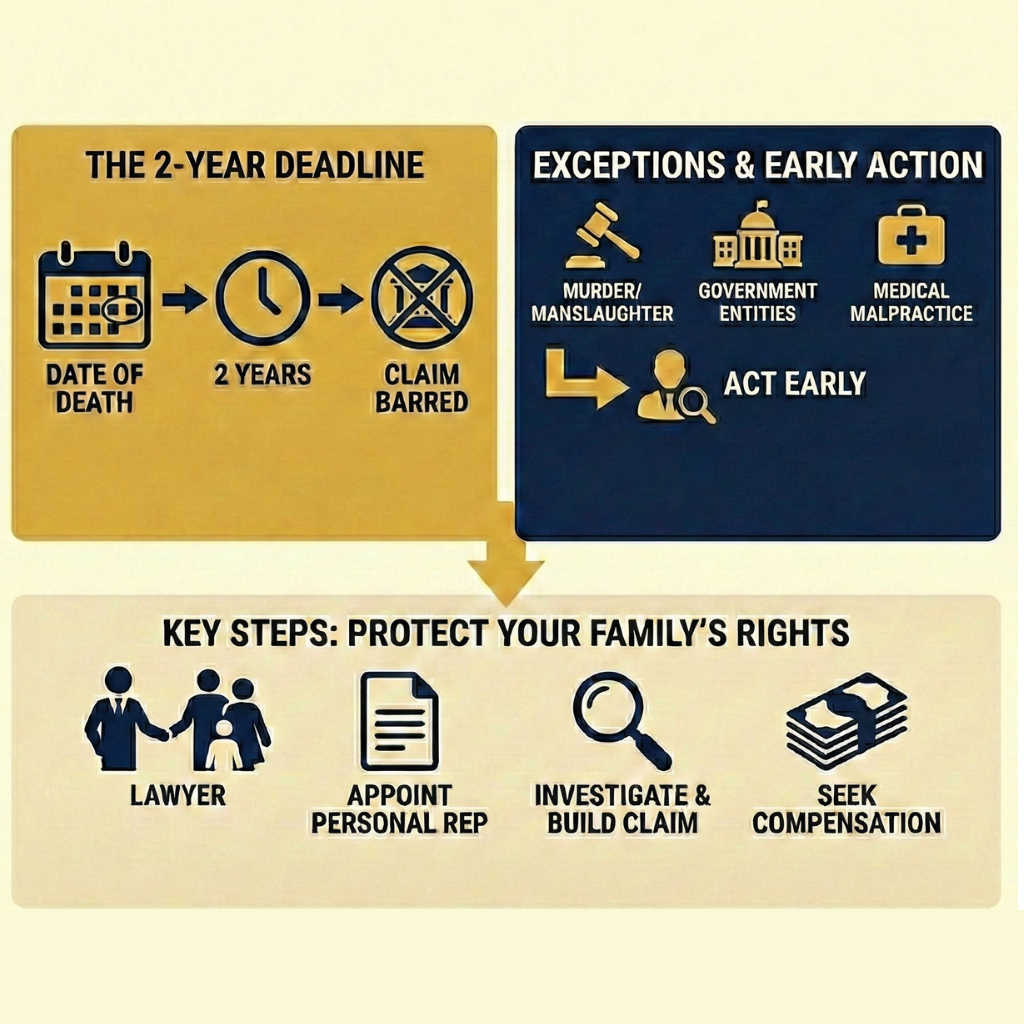

.png)
.png)
.png)
.png)

